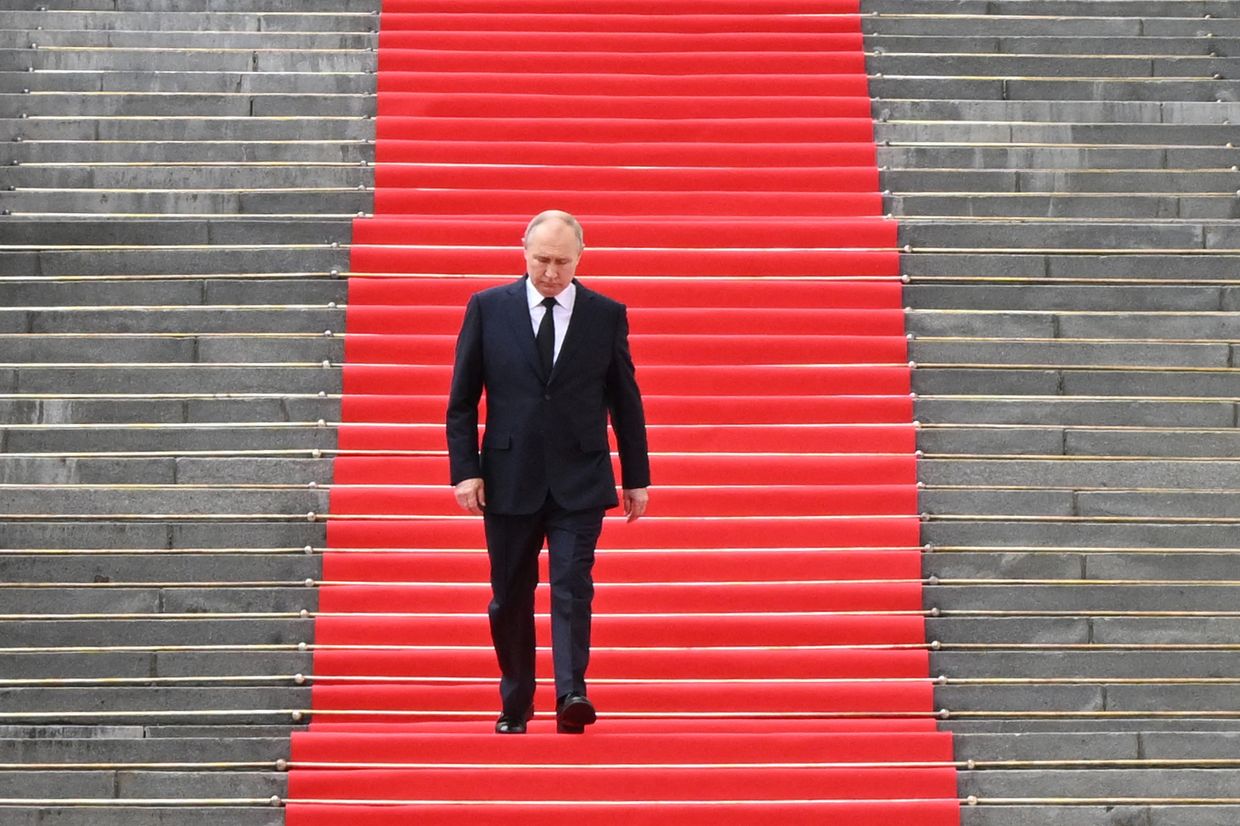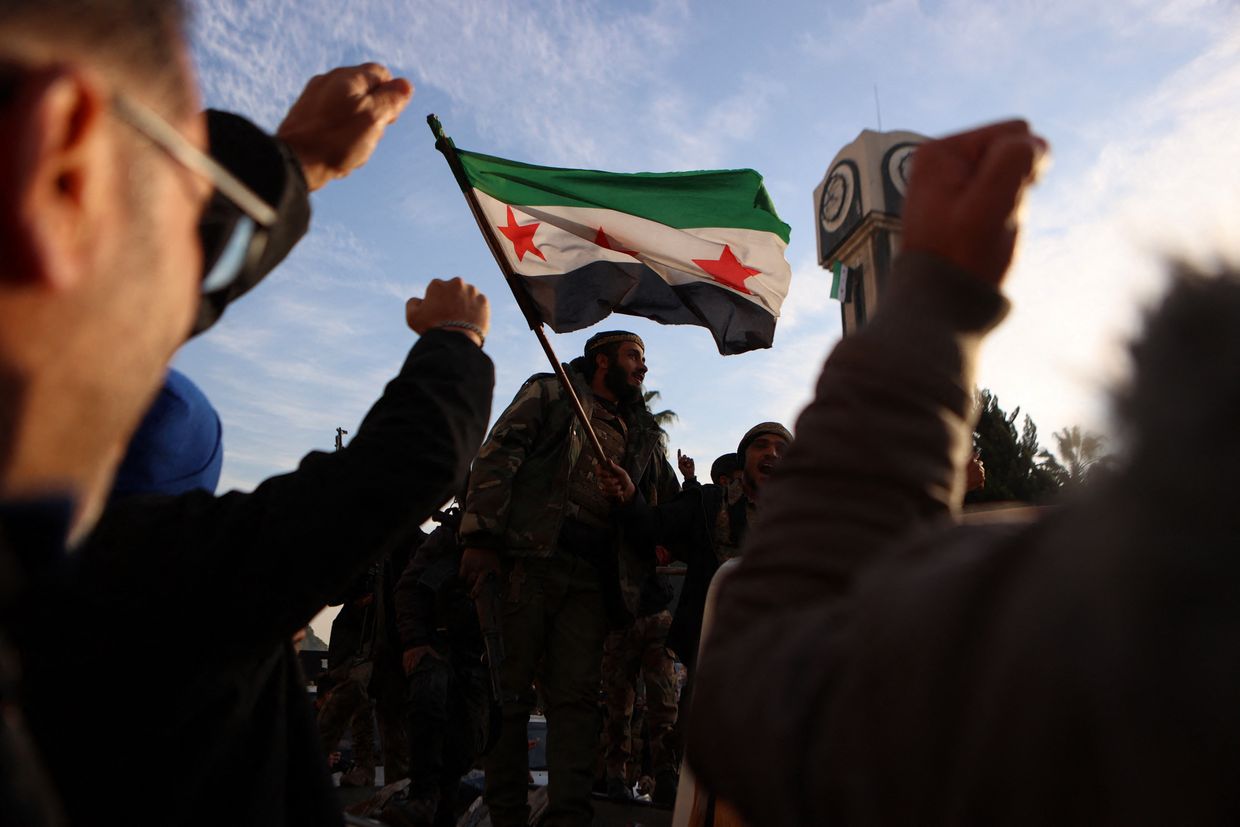'Russian colonialism is not reformable,' says historian Botakoz Kassymbekova

Russian Communist Party activists hold flags and a portrait of Soviet leader Joseph Stalin during a commemoration at Red Square in Moscow, Russia on Dec.21, 2022. (Contributor/Getty Images)
Most Russians seem unwilling to give up the privileges the government gives them at the expense of the country's ethnic minorities, says Botakoz Kassymbekova, a historian focusing on Eastern Europe at the University of Zurich.
"Russian colonialism is not reformable," she says.
"Russian dissidents want to retain the empire, which means they want to maintain the status quo,” Kassymbekova alleges. “This status quo will never bring democracy, simply because an empire is an authoritarian system," she adds.
Since Russia launched its full-scale invasion of Ukraine in February 2022, a number of activists have ramped up their calls to decolonize Russia, a country of over 140 million people spreading across 11 time zones.
Some believe Russia is among the last empires still standing, being a vast and highly centralized state that rules over a variety of different peoples. Russian “national republics,” regions that were created to give a form of autonomy to national minorities living in them, are, in fact, governed from Moscow, with governors directly appointed by Russian President Vladimir Putin.
Some believe Russia is among the last empires still standing, being a vast and highly centralized state that rules over a variety of different peoples.
People living in such republics have little to no say in who governs them and how.
Out of Russia’s 10 poorest regions, nine are national republics. The national republics in Russia have also been hit the hardest by the war, with the highest numbers per capita mobilized and killed on the battlefield.
The push for decolonization and de-Russification has gained some traction in those regions.
Meanwhile, countries neighboring Russia that were part of the Russian Empire and later the Soviet Union and gained independence in the 1990s have actively fought to preserve their national identity, language and culture that Moscow had spent centuries attempting to erase. Those countries include Kazakhstan, Kassymbekova's homeland.
Kassymbekova's book 'Despite Cultures: Early Soviet Rule in Tajikistan' explores Soviet imperial strategies in Central Asia and examines how dictatorships maintain control across vast distances. Kassymbekova specializes in Stalinism (named after Soviet tyrant Joseph Stalin), post-Stalinism, and Russian and Soviet imperial history.

Kassymbekova is currently working on another book, 'Imperial Innocence,' which delves into how Russia uses a victim narrative to justify its imperial policies and how the cult of martyrdom is embedded in Russian colonial identity.
The Kyiv Independent spoke with Kassymbekova about the romanticization of the Soviet Union in the West, the fundamental aspects of Russian colonialism, and the prospects for decolonization, as well as about parallels between the histories of Ukraine and Kazakhstan under Russian rule.
This interview was edited and shortened for clarity.
The Kyiv Independent: Lately, there has been a trend among some young people in the West, mainly left-wing, to romanticize the Soviet Union. They see it as an anti-imperial state where different nations were liberated and coexisted peacefully with equal rights. Where do you think this romanticization comes from, especially among those who didn't experience life in the Soviet Union?
Botakoz Kassymbekova: The idea that the Soviet Union was a modernizing, equalizing, and progressive state has a long history in Western thought. I think it comes from the situation when scholars privilege theory over people.
The Marxist theory says that capitalism is the source of injustice, exploitation, and inequalities. This idea has a very imperial or colonial thinking because it implies that if we just fix the system — some economic procedures, or property rights — everything will be fine. However, it doesn't take into account the people. They know what is good for them and can decide how they should live and manage themselves.
Saying that 'we capitalist societies are really bad, look what we did to our colonies. What people in Moscow did is much better' is a comparison of privileged white men to other privileged white men and their intrusion into foreign societies. It implies that a small group of white men are the ones who can fix the world — they just need to figure out how. But the whole idea of fixing the world centrally and from a single perspective led to millions of deaths, suffering, and unfreedom.
I'm afraid of these ideas because they treat people as subjects rather than equal participants in discussions about justice and equality. The whole Soviet history, then, becomes simply an intellectual exercise.

The Kyiv Independent: We know that in the 1930s, during the reign of Joseph Stalin, over a million people in Kazakhstan died as a result of a famine caused by the Soviet government's forced collectivization. In Ukraine, the Soviets starved people in what became known as Holodomor. What parallels can you draw between Kazakhstan and Ukraine in relation to Russian imperial policies?
Botakoz Kassymbekova: The starvation of the 1930s is probably the key historical event that united us (Ukraine and Kazakhstan) in this colonial dimension, along with the traumas that followed. Then, in the early 1990s, both Ukraine and Kazakhstan were pressured by Western countries to give up their nuclear arsenals.
Another aspect is that almost all of the Soviet nuclear arsenal was tested in Kazakhstan. Over 400 nuclear bombs and missiles were detonated in Kazakhstan, which is equivalent to enduring several nuclear wars.
Russification is another crucial part of the colonial experience. In this regard, we ((Ukrainians and Kazakhs) understand each other very well. Other Central Asian countries were somewhat luckier, as they didn't experience Russification as intensely as the Kazakhs. The elimination of our cultural elites, economic and political dependence (on Russia), and the joy of (gaining) independence were very similar (for both Ukraine and Kazakhstan.)
Russification is another crucial part of the colonial experience.
However, there are also differences. Many Ukrainians were deported to Kazakhstan, but they could still enjoy greater social mobility compared to Kazakhs because the Soviet Union was an extremely racist place. If you were 'more white,' you had more chances for social mobility.
The Kyiv Independent: Meanwhile, in Russia, the cult of Stalin is flourishing again, and Putin is trying to promote the idea that he will lead his country to victory in the war against Ukraine like Stalin did in World War II. Can you explain what's happening with Russia's national ideology right now? And what exactly is this 'Russian world' we keep hearing about?
Botakoz Kassymbekova: With the wars in (the Chechen Republic) of Ichkeria, Putin promoted the idea of being the 'master of the house' who would restore order, much like Stalin. He sold this vision to Russians, saying, 'You don't need to do anything; I'll take care of you. I'll make the streets safe, bring prosperity, and we'll keep robbing the colonies — taking their gas and oil — and they won't want independence.'
There was this idea (in Russia) that people just need to enjoy life — 'you don't need to do politics; you just need to have a good life.' People took this chance, traveled around the world, and enjoyed their privileges, mostly, of course, people from the metropoles, Moscow and St. Petersburg. Putin also allowed people to do some critical thinking so that he could say that Russia wasn't a totalitarian regime.
"you don't need to do politics; you just need to have a good life."
We often focus on Russia's dictatorship and authoritarianism, but the colonial aspect of this system is often overlooked. It's about making every single Russian feel superior to non-Russians. That's why Putin became popular. The annexation of Crimea strengthened this further, as it allowed Russians to feel even more privileged, showing them that they could not only steal money and resources from non-Russians and from other republics but actually gain new territories.

The Kyiv Independent: You're working on a book called 'Imperial Innocence.' Could you explain what you mean by that concept and how it relates to what's happening in modern Russia?
Botakoz Kassymbekova: In the book, I explore how the Russian state crafted the idea that its empire brings good, that it is a liberating empire, and that the Russian people are martyrs sacrificing themselves for the good of other people. This archetype of Jesus Christ is crucial for Russian identity.
When Ilya Yashin (Russian opposition activist freed in the recent East-West prisoner exchange) faced criticism for wanting to return to prison and not mentioning Ukrainian suffering, Russian journalist (Yulia) Latynina wrote on social media, 'those critics just envy you because you had a chance to hang on a cross.' So she basically said they were envious because (Yashin got to be) Jesus Christ for a moment. (Alexei) Navalny, (Vladimir) Kara-Murza, and Yashin all play according to this textbook (which says) that your achievement as a Russian is when you suffer.
Imperial innocence is a very effective tool because many Russians have internalized it. When I talk about Russian imperialism or colonialism, people take it personally, and a discussion about the crimes against humanity that were carried out for that empire becomes extremely difficult. The conversation becomes about personal guilt, with people asking, 'Do you think I'm a bad person?' But it's not about bad or good people; it's about the system that allows the structures and narratives that, in turn, allow these crimes to take place, and one really needs to part with them. This belief in being 'good people' with a 'special soul' prevents (many in Russia) from acknowledging the other side of the story.
This belief in being 'good people' with a 'special soul' prevents (many in Russia) from acknowledging the other side of the story.
The Kyiv Independent: Why do you think many Russian opposition politicians are resistant to discussions about the decolonization of Russia?
Botakoz Kassymbekova: One of the main arguments put forward by Russian dissidents is that they are 'bringing good' to other peoples, justifying the need to maintain the empire. I don't call them opposition because we don't know if they would even be elected as an opposition if they had the chance.
When we talk about the 'Russian opposition,' we often overlook the opposition of national republics like the Bashkirs, Tatars, Ichkerians (Chechens), and others. They are the majority of the opposition, and they support decolonization, while only a small Russian minority opposes it because they want to keep their privileges. They live on the backs of the national opposition.
They live very well, travel around the world, and represent a big empire. You just need to criticize Putin on YouTube, and you will be welcomed in Washington, London, or Berlin. It's a comfortable position to be in.

The level of racism and xenophobia is so high that (Russian dissidents) refuse to engage with or even mention people from national republics, essentially trying to erase them with this attitude. This is a conscious strategy.
Because (Russian dissidents) are accepted as legitimate opposition leaders in the West, they feel entitled to speak on behalf of Chechens, Tatars, Kalmyks, and Sakha — groups that don't want (the Russian dissidents) speaking for them. Recently, three Russian scholars from the metropolitan region, now living in the West, proposed a new Russian constitution. They proposed to eliminate the national republics and create new kinds of constituents in Russia without even asking representatives of these republics whether they still wanted (these institutions) to exist.
The Kyiv Independent: Based on what you know about Russian history, do you think there will be any significant changes once Putin is no longer in power? Could there be a shift where Russians acknowledge their country's imperial nature and take responsibility for it?
Botakoz Kassymbekova: I believe that Russian colonialism and Russian colonial identity are not reformable, just as Communism wasn't. Nearly three years have passed (since the full-scale invasion of Ukraine), and we still haven't seen any roadmap from Russian intellectuals on how to rethink Russian colonialism. Nobody really wants to talk about it. If the horrific images from Mariupol and Bucha did not spark any awakening, nothing will.
"If the horrific images from Mariupol and Bucha did not spark any awakening, nothing will."
But again, when we think about Russia, we must not overlook the national republics because their situation is very different. National awakening is happening rapidly (within these republics) because their populations die in much higher numbers than metropolitan Russians who have not been affected by the war so much. Many people in the national republics feel the pain of Ukrainians because their forefathers had experienced exactly what Ukrainians are going through today.
A huge political change is occurring (in Russia), but it's not coming from the colonizers but rather from the national republics. Whether they will succeed in their quest for independence, we don't know. But (the national awakening) is there, and it is very significant. I think they are the only hope.
The Kyiv Independent: So, do you think the representatives of national republics could actually be the ones who will bring change to Russia and help get rid of this authoritarian regime?
Botakoz Kassymbekova: Russia doesn't need help to get rid of the authoritarian regime; it thrives on this very regime, which is foundational to Russian colonialism and imperialism. Russian dissidents want to retain the empire, which means they want to maintain the status quo. (However), this status quo will never bring democracy simply because an empire is an authoritarian system.
When the Russian government can no longer offer imperial privileges, perhaps the authoritarian regime will become less attractive, and people will take to the streets. But it's naive to believe that someone — be it Kara-Murza, Yashin, or anyone else — can come up with a single idea or word and fix Russia. This is a structural and systemic problem.
It seems a point of no return has been reached. In the national republics, a critical mass (of people) is emerging who refuse to turn back and no longer believe in any promises. We are at a historical moment; the myth of the Russian Empire and its greatness has died and won't be revived anytime soon.














